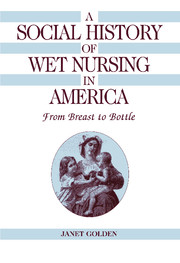Book contents
- Frontmatter
- Contents
- List of tables
- Acknowledgments
- List of abbreviations
- Introduction
- 1 Public discourse and private relations: Wet nursing in colonial America
- 2 The new motherhood and the new view of wet nurses, 1780–1865
- 3 Finding “just the right kind of woman”: The urban wet nurse marketplace, 1830–1900
- 4 “Victims of distressing circumstances”: The wet nurse labor force and the offspring of wet nurses, 1860–1910
- 5 Medical oversight and medical dilemmas: The physician and the wet nurse, 1870–1910
- 6 “Obliged to have wet nurses”: Relations in the private household, 1870–1925
- 7 “Therapeutic merchandise”: Human milk in the twentieth century
- Epilogue: From commodity to gift
- Index
- Cambridge History of Medicine
1 - Public discourse and private relations: Wet nursing in colonial America
Published online by Cambridge University Press: 06 July 2010
- Frontmatter
- Contents
- List of tables
- Acknowledgments
- List of abbreviations
- Introduction
- 1 Public discourse and private relations: Wet nursing in colonial America
- 2 The new motherhood and the new view of wet nurses, 1780–1865
- 3 Finding “just the right kind of woman”: The urban wet nurse marketplace, 1830–1900
- 4 “Victims of distressing circumstances”: The wet nurse labor force and the offspring of wet nurses, 1860–1910
- 5 Medical oversight and medical dilemmas: The physician and the wet nurse, 1870–1910
- 6 “Obliged to have wet nurses”: Relations in the private household, 1870–1925
- 7 “Therapeutic merchandise”: Human milk in the twentieth century
- Epilogue: From commodity to gift
- Index
- Cambridge History of Medicine
Summary
Women who refuse to suckle their infants are “dead while they live,” wrote Cotton Mather in 1710. The celebrated Puritan minister's sentiments fore-shadowed generations of “family advisers,” who praised mothers for breast-feeding and excoriated those who hired wet nurses. Yet social observers, including Mather, understood that families sometimes needed wet nurses – women who played a vital, indeed life-giving, role in the nursery. Mather himself retained a wet nurse for at least one of his fifteen children, and he kept his own former wet nurse on his charity list.
The breach between cultural prescription and biological need marked Mather's writings as well as his life. In the former, he articulated both the religious objections to wet nurses and the practical reasons for using them. Elizabeth in Her Holy Retirement (1710), written to “Prepare a Pious Woman for Her Lying In,” instructed mothers to suckle their own infants when possible and chided those who refused to do so: “be not such an ostrich as to decline it.” However, for those who tried and failed he had words of solace: “entertain it with submission to the will of God.” More pragmatic advice appeared in The Angel of Bethesda (1722), in which Mather summarized his knowledge of medicine, including the treatment of common illnesses and the promotion of health. In this volume, Mather suggested ways to increase the milk of either a wet nurse or a mother through the use of drugs and diet.
- Type
- Chapter
- Information
- A Social History of Wet Nursing in AmericaFrom Breast to Bottle, pp. 11 - 37Publisher: Cambridge University PressPrint publication year: 1996



